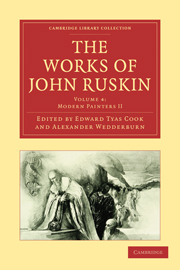Book contents
- Frontmatter
- Contents
- LIST OF ILLUSTRATIONS
- INTRODUCTION TO THIS VOLUME
- BIBLIOGRAPHICAL NOTE
- MODERN PAINTERS
- AUTHOR'S PREFACE TO THE RE-ARRANGED EDITION (1883)
- AUTHOR'S SYNOPSIS OF CONTENTS
- PART III OF IDEAS OF BEAUTY
- SECTION I OF THE THEORETIC FACULTY
- CHAPTER I OF THE RANK AND RELATIONS OF THE THEORETIC FACULTY
- CHAPTER II OF THE THEORETIC FACULTY AS CONCERNED WITH PLEASURES OF SENSE
- CHAPTER III OF ACCURACY AND INACCURACY IN IMPRESSIONS OF SENSE
- CHAPTER IV OF FALSE OPINIONS HELD CONCERNING BEAUTY
- CHAPTER V OF TYPICAL BEAUTY:–FIRST, OF INFINITY, OR THE TYPE OF DIVINE INCOMPREHENSIBILITY
- CHAPTER VI OF UNITY, OR THE TYPE OF THE DIVINE COMPREHENSIVENESS
- CHAPTER VII OF REPOSE, OR THE TYPE OF DIVINE PERMANENCE
- CHAPTER VIII OF SYMMETRY, OR THE TYPE OF DIVINE JUSTICE
- CHAPTER IX OF PURITY, OR THE TYPE OF DIVINE ENERGY
- CHAPTER X OF MODERATION, OR THE TYPE OF GOVERNMENT BY LAW
- CHAPTER XI GENERAL INFERENCES RESPECTING TYPICAL BEAUTY
- CHAPTER XII OF VITAL BEAUTY. I. OF RELATIVE VITAL BEAUTY
- CHAPTER XIII II. OF GENERIC VITAL BEAUTY
- CHAPTER XIV III. OF VITAL BEAUTY IN MAN
- CHAPTER XV GENERAL CONCLUSIONS RESPECTING THE THEORETIC FACULTY
- SECTION II OF THE IMAGINATIVE FACULTY
- APPENDIX
- Plate section
CHAPTER X - OF MODERATION, OR THE TYPE OF GOVERNMENT BY LAW
Published online by Cambridge University Press: 05 September 2013
- Frontmatter
- Contents
- LIST OF ILLUSTRATIONS
- INTRODUCTION TO THIS VOLUME
- BIBLIOGRAPHICAL NOTE
- MODERN PAINTERS
- AUTHOR'S PREFACE TO THE RE-ARRANGED EDITION (1883)
- AUTHOR'S SYNOPSIS OF CONTENTS
- PART III OF IDEAS OF BEAUTY
- SECTION I OF THE THEORETIC FACULTY
- CHAPTER I OF THE RANK AND RELATIONS OF THE THEORETIC FACULTY
- CHAPTER II OF THE THEORETIC FACULTY AS CONCERNED WITH PLEASURES OF SENSE
- CHAPTER III OF ACCURACY AND INACCURACY IN IMPRESSIONS OF SENSE
- CHAPTER IV OF FALSE OPINIONS HELD CONCERNING BEAUTY
- CHAPTER V OF TYPICAL BEAUTY:–FIRST, OF INFINITY, OR THE TYPE OF DIVINE INCOMPREHENSIBILITY
- CHAPTER VI OF UNITY, OR THE TYPE OF THE DIVINE COMPREHENSIVENESS
- CHAPTER VII OF REPOSE, OR THE TYPE OF DIVINE PERMANENCE
- CHAPTER VIII OF SYMMETRY, OR THE TYPE OF DIVINE JUSTICE
- CHAPTER IX OF PURITY, OR THE TYPE OF DIVINE ENERGY
- CHAPTER X OF MODERATION, OR THE TYPE OF GOVERNMENT BY LAW
- CHAPTER XI GENERAL INFERENCES RESPECTING TYPICAL BEAUTY
- CHAPTER XII OF VITAL BEAUTY. I. OF RELATIVE VITAL BEAUTY
- CHAPTER XIII II. OF GENERIC VITAL BEAUTY
- CHAPTER XIV III. OF VITAL BEAUTY IN MAN
- CHAPTER XV GENERAL CONCLUSIONS RESPECTING THE THEORETIC FACULTY
- SECTION II OF THE IMAGINATIVE FACULTY
- APPENDIX
- Plate section
Summary
Meaning of the terms Chasteness and Refinement
Of objects which, in respect of the qualities hitherto considered, appear to have equal claims to regard, we find, nevertheless, that certain are preferred to others in consequence of an attractive power, usually expressed by the terms ‘chasteness,’ ‘refinement,’ or ‘elegance:’ and it appears also that things which in other respects have little in them of natural beauty, and are of forms altogether simple, and adapted to simple uses, are capable of much distinction and desirableness in consequence of these qualities only. It is of importance to discover the real nature of the ideas thus expressed.
How referable to temporary fashions;
Something of the peculiar meaning of the words is referable to the authority of fashion and the exclusiveness of pride, owing to which that which is the mode of a particular time is submissively esteemed, and that which by its costliness or its rarity is of difficult attainment, or in any way appears to have been chosen as the best of many things (which is the original sense of the words elegant and exquisite), is esteemed for the witness it bears to the dignity of the chooser: but neither of these ideas is in any way connected with constant beauty: neither do they account for that agreeableness of colour and form which is especially termed chasteness, and which it would seem to be a characteristic of rightly trained minds in all things to prefer, and of common minds to reject.
- Type
- Chapter
- Information
- The Works of John Ruskin , pp. 135 - 141Publisher: Cambridge University PressPrint publication year: 2010First published in: 1903



